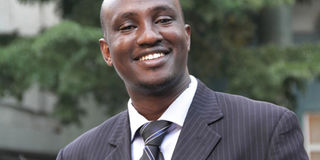Kombani: How Prof Eshiwani rescued my career in writing

PHOTO | FILE Author Kinyanjui Kombani.
What you need to know:
- Were it not for the encouraging comments of Mr David Mulwa, my mentor, The Last Villains of Molo would probably still be only a story lingering in my head.
- I have had the luck of being commissioned by my publisher to write stories for new series. I wrote We Can Be Friends under great duress.
Teachers can make or break careers. I never knew I could write, at least not professionally, until the day I gave my lecturer, Gachanja Kiai, one of the short stories I intended to submit for a competition.
To my surprise, he shared the story with the rest of the class, saying he had never read such a great story. He also introduced me to my first publisher.
Were it not for the encouraging comments of Mr David Mulwa, my mentor, The Last Villains of Molo would probably still be only a story lingering in my head.
My other mentors included the late Dr Ezekiel Alembi, Prof Oluoch Obura and Prof Emmanuel Mbogo.
Each of my books is a story in itself. I could actually write another novel about the making of the books!
The Last Villains of Molo has become one of the most critically acclaimed books in Kenya in the recent times. It has been studied in universities in Kenya and Germany. At post-graduate level, it has been part of theses at University of Sussex and Harvard. Yet, the book almost never saw the light of day.
When the manuscript was accepted by the publisher in 2003, I was struggling to make ends meet at Ngando, a slum off Ngong Road. The publisher wanted me to change about a third of the story, yet I did not have access to a computer – the manuscript itself had been typed at the goodwill of my friends, the Mudolas, at their typing bureau in Lang’ata.
SHOOTING POOL
I used to save money for bus fare to Lang’ata for a week (I would shoot pool for a living), hoping there weren’t too many customers or else I would do nothing the whole day.
My university could not help much – there was only one computer at the Literature department in Kenyatta University then, and it was only used by the secretary. I almost lost hope.
Ironically, it was Prof George Eshiwani, the feared administrator (he was the Vice-Chancellor), who came to my rescue. One day, in desperation, I broke through his security cordon and told him my predicament, expecting a harsh rebuttal.
To my surprise, he turned to his PA and asked her to help me. “This is the next Ngugi wa Thiong’o,” he said.
From that day, I had three secretaries at my disposal! I would write in long hand at night on foolscap and deliver the write-up to the secretaries the following morning for typing. The manuscript was ready in a week. And that is how The Last Villains of Molo came to be.
One day, much later, I sat at the KU Culture Week office with my friends Prof Mbogo and ‘Shibi’. On the table was a Sasa Sema Publications brochure. I wondered aloud why there was no book in the Lion’s Series about Wangari Maathai.
“Why don’t you write it?” the professor challenged me. He never gave me any peace until I had done a rough synopsis and sent it to the publisher. By the time the publisher got back to me, two weeks later, Prof Mbogo had harassed me enough to wrench a story out of me.
The publishers said they loved the synopsis and wanted to know when I could submit the story. I was ready with the story, thanks to the prodding by the good professor. Wangari Maathai: Mother of Trees has now been approved by KIE for use in Kenyan schools.
I have had the luck of being commissioned by my publisher to write stories for new series. I wrote We Can Be Friends under great duress.
One week after my wedding, my sister passed away. I wrote the story on the journey back to Nairobi because it was due a day after her burial. The children’s book is also KIE approved.
Writing Lost But Found, another commissioned work, was also very challenging because I had to bring myself to the level of a five-year-old. I rewrote the manuscript 12 times before the publisher accepted it!
EXTRA-JUDICIAL KILLINGS
My new novel, Den of Iniquities, was conceptualised during the week in which my uncle was hospitalised. His neighbours from Dandora kept talking about their friends and kin who had been killed in cold blood by police. The book is about extra-judicial killings.
My writing journey has not been easy, but it has been very fulfilling.
I have had the chance to share my writing story at ‘Authors Buffet’, an event that brings together book lovers and authors.
The second edition of the Buffet was held last Saturday at the Sarit Centre, Nairobi, and featured 35 authors. There were book launches by Ken Walibora, David Mulwa, Ephantus Achebi, Millicent Odhiambo and Bonnie Kim.
AUTHORS BUFFET
Other writers who attended included Winnie Thuku, Anthony Gitonga, Mbugua Mumbi, Binyavanga Wainaina, Charles Orero, Jennifer Karina, Joseph Ngunjiri, Muthoni Likimani, John Sibi-Okumu, Stephen Kigwa, Winstones Churchill, Stanley Gazemba, Felix Onyango, Lucy Kiruthu, Kap Kirwok, Gibson Anduvate, Alfred Arita, Enock Matundura, Clifford Oluoch, Murori Kiunga and Barrack Muluka.
There was also a special appearance by Zukiswa Wanner of South Africa and Richard Crompton of UK. Musyoki Muli, the managing director of Longhorn Publishers, talked about Publishing in Kenya.
The event was supported by Text Book Centre, Kenya Publishers Association, Saturday Nation, Standard Group and Jabali Furniture.
Kinyanjui Kombani is a creative writer, banker, trainer, award-winning entrepreneur and certified business mentor. www.kinyanjuikombani.com
Are you a published author? Tell us your experience in your own words. Send your story to: [email protected]



